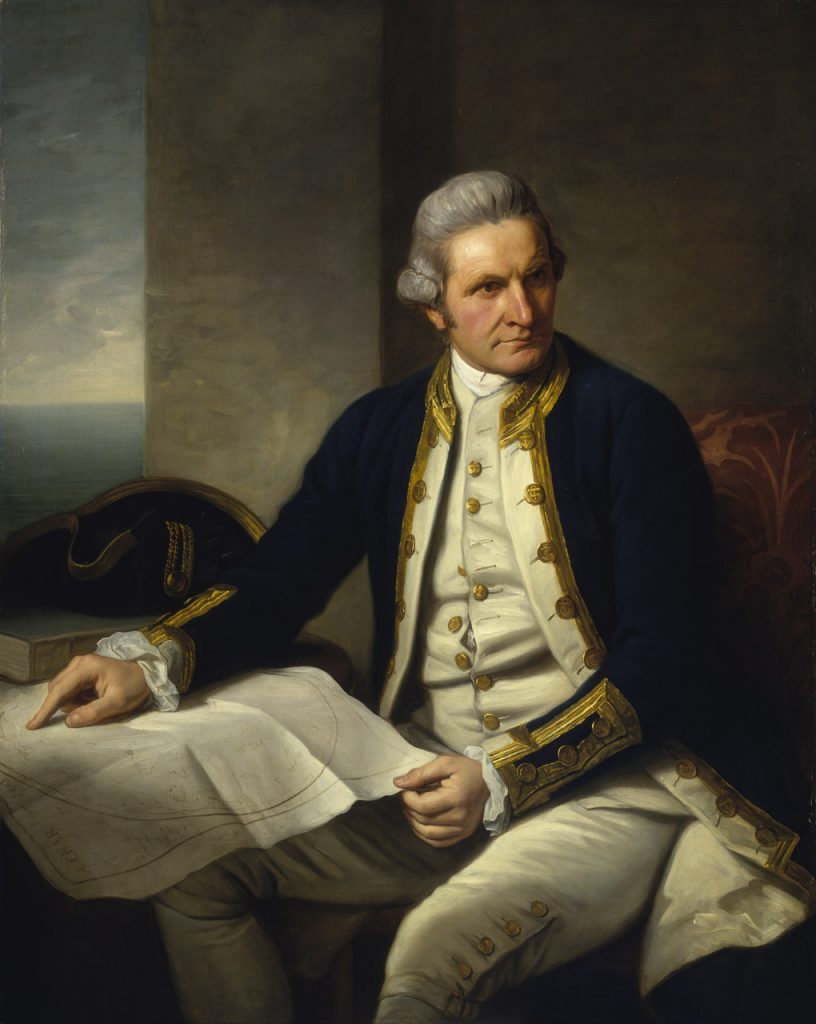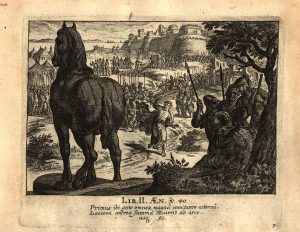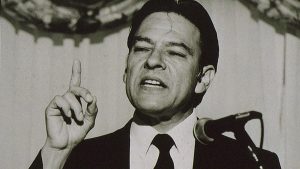Throughout the eighteenth century, colonization and trade were the premier way for a country to spread its influence. Countries all across Europe began to launch naval expeditions in hopes of finding riches elsewhere. The British Empire in particular benefited immensely from imperialism.1 With the efforts of British explorer James Cook, the British Empire was able to expand its influence through newly gathered information about the Pacific.
Born in 1725, James Cook grew up in a small village, named Marton, in the northern county of Yorkshire, England.2 The Cook family was penniless and couldn’t possibly pay for an elaborate education for James, but with the financial backing of the unlikely sponsor, James’ father’s employer, Cook at least had access to a standard education. When Cook graduated, he quickly realized how bland the working world was, and he hated his day-to-day job as a salesman. It was no surprise then when, in July 1746, Cook jumped at the opportunity to be the apprentice of John Walker, master mariner and coal shipper at the nearby port, Whitley.
For the next nine years, under the supervision of John Walker, Cook sharpened his skills in navigation. Walker then offered Cook a command over one of his ships as a reward for his progress. Instead of accepting John Walker’s offered to a high-status position, Cook chose instead to enlist in the British Navy. Soon after enlisting in the Navy, Cook deployed on the Pembroke, a sixty-four-gun ship, to aid in the war efforts against the French.3

While on board the Pembroke, under the tutelage of renowned military surveyor Sam Holland, Cook learned how to improve his accuracy in surveying through trigonometry. The maps he produced were of extremely high quality, so much so that he was awarded the position Surveyor of Newfoundland and given command of a schooner called the Greenville.4 For the next five years, Cook created detailed maps of Canada’s Atlantic coastline. With the help of these maps, the British decisively defeated the French in the Seven Years War in 1763. British authorities were very impressed with Cook’s maps, for they showed that Cook possessed both a flair for seamanship and an understanding of scientific principles.
In 1768, the British Empire rewarded Cooks’ prowess with command of the Endeavor for a scientific expedition. During this voyage Cook, alongside a variety of astronomers, artists, and botanists, sailed to Tahiti to witness the celestial movements of Venus.5 For four months, the crew observed the sky and explored the recently discovered island of Tahiti. After their time on Tahiti, Cook moved on to the secret objective given to him by British Admiralty–to search for the fabled southern continent. While Cook found no mysterious, unknown continent, he did discover the island that would later be named New Zealand. Next, Cook sailed west to the eastern coast of Australia, unknowingly sailing into the Great Barrier Reef. Luckily, Cook skillfully navigated himself out of the reef and saved the expedition. From there on Cook sailed the southern coastline of Australia, charting its coasts. Finally, Cook left the Australian coast and charted his way to the island of Jakarta before making his way back to Britain in 1771.

James Cook’s first voyage was a success.6 It would be the first time that an explorer circumnavigated the world without loss or casualty. The British empire was ecstatic about his results, offering him command of another expedition. In 1772, Cook commanded the Resolution back to the coast of New Zealand and other southern Pacific islands. This time Cook was able to put away all doubts of a southern continent. Cook pushed his crew to the extreme by sailing through the frigid south. The exploration continued to sail south until it was evident that there was no hidden landmass. From there, Cook’s voyage returned to England in 1775.

Upon Cooks return, he was welcomed into the Royal Society, the prestigious institution that accepted only the brightest thinkers and the most innovative scientific minds.7 The Admiralty also rewarded Cook with retirement for all of his geographic discoveries. Cook accepted the offer, with the addendum that he could go on future expeditions if the opportunity arose. Just one year into his retirement, Cook eagerly jumped at the chance to lead another voyage. In 1776, Cook led an expedition to search for the Northwest Passage, a theoretical waterway which connected the northern Pacific and Atlantic Oceans.8 Again on board the Resolution, Cook departed from Britain and traveled to Cape Town, South Africa, then onward to New Zealand and eastward from there. During this journey, Cook and crew stumbled onto a group of islands that Cook would call the Sandwich Islands, what we know today as Hawaii. While on the island Cook was met by a tribe of indigenous people that seemed enamored by his appearance. After a few months of relaxation, the expedition picked up again, soon reaching the northwest coast of North America. Cook sailed down the coastline of Alaska all the way to Oregon, just to confirm that there wasn’t any passage. The expedition then left the North American coast to return to the island oasis in Hawaii.
When Cook again set anchor at the island, he was met with a group of indigenous people. However, this time the native people were hostile. In 1779, the Hawaiian natives mistakenly sacrificed Cook during a religious ceremony, stabbing and killing him there on the beach.9 In the wake of this accident, the expedition quickly fled the island and returned to England. Though Cook suffered a tragic death, his accomplishments have lived on. Before Cook’s three voyages, European knowledge of the Pacific was ambiguous. With the new found information of the Pacific, British influence expanded further, and trade became more efficient than ever before. It is evident that James Cook had a profound impact on the growth of not just European countries, but the entire world.
- Salem Press Biographical Encyclopedia, January 2016, s.v. “James Cook,” by Nina Hibbins. ↵
- World Eras, 2003, s.v. “James Cook.” ↵
- World Eras, 2003, s.v. “James Cook.” ↵
- World Eras, 2003, s.v. “James Cook.” ↵
- Science the Enlightenment: Encyclopedia, 2003, s.v. “James Cook.” ↵
- Salem Press Biographical Encyclopedia, January 2016, s.v. “James Cook,” by Nina Hibbins. ↵
- Science the Enlightenment: Encyclopedia, 2003, s.v. “James Cook.” ↵
- Salem Press Biographical Encyclopedia, January 2016, s.v. “James Cook,” by Nina Hibbins. ↵
- World Eras, 2003, s.v. “James Cook.” ↵



31 comments
Natalia Flores
Cook’s life is a rags to riches story filled with exploration and adventure. It’s hard to imagine a Europe without James Cook since he handed them victory during the seven years war. It is a tragedy that he ended up getting sacrificed during a religious ceremony. Cook’s artistic and accurate work is mind blowing considering that there was no modern mapping technology and everything was done through extensive mathematical calculations and observations. This was a great read.
Fumei P.
I liked how the author arranged the life of James Cook in chronological order. I admire James Cook for staying to true to himself time and time again. First, he ditched his boring job as a salesman to pursue something more exciting. Then he turned down the opportunity of a lifetime when John Walker offered him to take command of one of his ships. Instead he honed in on the skills he acquired as an apprentice and took his love for the open sea to the next level by joining the British Navy. He had a prolific career in the Navy, and did the impossible by charting the Pacific.
Cristian Medina-Lopez
I thought this article was well written with a lot of crucial facts about James Cook. The thing I liked the best about it was that it was all set in order, which made it really easy to understand. I found it interesting how his father’s employer sponsored his education which made him seek for more after graduating. This to me would seem like a moral that could be taken from it that there are people in your life that make you who you will be one day.
Sam Vandenbrink
James Cook is truly a very motivational figure, he was the first one to circumnavigate the world without an causality. The way that boats were ran in this day and how they operated was very dangerous, so casualties were not that uncommon. But Mr. Cook did it and made it around the entire world. Very inspirational! Good article haven’t read anything on the topic for a while so it was nice to have the information again.
Mario De Leon
Great article! It was very descriptive. I did not know a lot about James Cook before reading your article. It’s hard to believe that he denied being in command of his own ship and chose to join the Navy instead. I don’t think a lot of people would chose the same, but this was the better choice because he was able to improve his already great skills.
Nahim Rancharan
This was a very unique read, especially since I had no prior knowledge of who Jim Cook was or what his accomplishments were. I like how the article is presented as a Classics ‘rags to riches’ story which shows that with enough persistence and perseverance, anyone can accomplish their dreams despite whatever backgrounds or situations they may come from. I was interested to read about his involvement in the discovery of places like Hawaii, New Zealand, Australia, and Tahiti. Even more so, the article was really captivating at the end with the inclusion unfortunate recount of his death. Over, this was an excellent article. Great Work!
Ana Gonzalez
Great article! James Cook sounds like such an interesting, adventurous and worldly person. He definitely contributed to the navigation history. Your article is well-written and organized so it did a great job telling the interesting story of Cook. It’s very interesting that he drew accurate maps and even found New Zealand. What I found interesting is that he was not traveling to conquer people and gain land, but he was sailing to learn about the world and even, in one occasion, study Venus. Great article!
Marissa Gonzalez
This article is very detailed and thoroughly describes James Cook’s accomplishments. It is great he received recognition for his intelligence, his voyages, and his mapping calculations. I was not too familiar with who James Cook was, however, this article shines a positive light on him due to his accomplishments disregarding his upbringing. It was unexpected to learn that he was mistakenly sacrificed and it is unfortunate that occurred. It makes me wonder if he would have had any more successful events in his future. Great article!
Cameron Mays
I really enjoyed reading this article as it feels like it was researched quite thoroughly and doesn’t leave anything out that should be there. Furthermore, it’s a topic and person that isn’t discussed very often, which makes your article even more enticing. Also, the way you organized the article was also correct as it tells his life story, so it should be chronological, and it was. One last note, your sentence structure and grammar also didn’t have any problems, and I was never lost in your article.
Bailey Rider
Fantastic, well written article! It was interesting to learn about how James Cook could accomplish so much, even though he had a rough upbringing. I had never realized what a poor upbringing he had but its cool that he had a mentor to teach him all the skills he needed to succeed. It was so interesting to learn that because of him, the British were able to defeat the French! Thanks for the article!